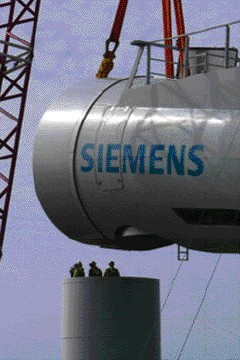
Engineering giant Siemens has criticised UK government policies for creating uncertainty, hampering investment in gas plants, wind farms and factories.
Under the Conservative-Liberal Democrat coalition government from 2010 through May 7 last year, there was no visibility on energy policy beyond 2020, and a “hiatus” followed during the first six months of Prime Minister David Cameron’s majority Conservative administration, according to Matthew Knight, director of energy strategy and government affairs at Siemens.
Speaking at a meeting of the Energy and Climate Change Committee in Westminster, Knight said: “That’s no way to run the strategic energy policy of the country.”
“Many of the investments we have looked at we are not doing, and you’ll never get to hear about them.”
The UK faces an electricity supply crunch after it pledged to close all coal plants that don’t capture their emissions by 2025, while struggling to incentivise the construction of new nuclear and gas plants.
Energy Secretary Amber Rudd spent her first half-year in the role cutting subsidies for renewable energy, and has yet to spell out firm plans for the industry.
“Our top priority is providing secure, clean and affordable energy for hardworking families and businesses,” DECC said. “We have a clear, long-term plan which focuses on protecting bill payers, ensuring technologies stand on their own two feet whilst also meeting our renewable energy commitments.”
Rudd’s cutbacks to onshore wind and solar power have dented those industries.
She hasn’t detailed the amount of incentives available to offshore wind, the main renewable energy technology that’s mostly unscathed. In a speech in November dubbed by her department as a “reset” intervention, she vowed to hold three auctions in five years for “contracts-for-difference” that guarantee power prices for offshore wind projects.
“If you’re an offshore wind developer, you know there is an intention to have three allocation rounds in this parliament, but we don’t know the exact timescales,” Niall Stuart, chief executive officer of the Scottish Renewables lobby group, told the panel.
“People are scaling back investment or freezing investment altogether on projects that they don’t see a clear route to market for.”
Rudd’s speech and the UK commitments set down in Paris mean “we started to see the mist clearing,” according to Knight.
Even so, it’s “very challenging” to make investment decisions, he said.
Knight pointed to eight potential combined cycle gas turbine projects that have been waiting to be built for four or five years in Britain, but haven’t had the incentives required to proceed.
“We know that the UK is going to need these things,” he said. “The jeopardy is when? And will it be left to the last minute?”
He also said he’s been involved in two “large potential factories,” not with Siemens, that would have created several hundred UK jobs apiece.
“Both of them foundered on lack of a visible forward pipeline for projects in the UK,” he said. “It’s a lost opportunity.”
Recommended for you
